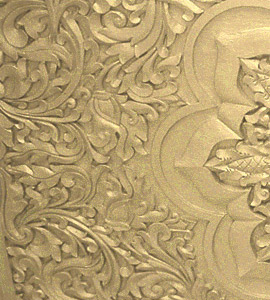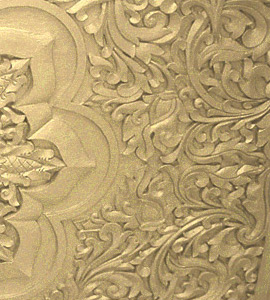


Mr S N Goenka
"The only conversion involved in Vipassana is from misery to happiness, from bondage to liberation, " - S.N. Goenka
Mr Satya Narayan Goenka (born 1924) is a Principal Teacher of Vipassana, the practical quintessence of the Buddha's teaching and a student of Sayagyi U Ba Khin . He has trained more than 800 assistant teachers and each year more than 100,000 people attend Vipassana courses.
Goenkaji emphasises that, “The Buddha never taught a sectarian religion; he taught Dhamma - the way to liberation - which is universal” and presents his teachings as non-sectarian and open to people of all faiths or no faith. Goenkaji calls Vipassana meditation an experiential scientific practice, through which one can observe the constantly changing nature of the mind and body at the deepest level, a profound understanding that leads to a truly happy and peaceful life.
A leading industrialist in Myanmar (Burma) after the Second World War, Goenkaji, as he is affectionately known, is living proof that the mental exercise of meditation is necessary for a wholesome and beneficial life. Known for his humility, deep compassion, unperturbed composure, Mr. Goenka's emphasis on the self-dependent, non-sectarian and result-oriented nature of Vipassana found appeal in a world searching for a practical path out of stress and suffering.
As an indicator of the increasing universal acceptance of the Buddha's scientific teachings, Mr. Goenka has been invited to lecture by institutions as diverse as the United Nations General Assembly, members of the Indian Parliament, Harvard Business Club, Dharma Drum Mountain Monastery (of Ven. Sheng Yen) in Taiwan, the World Economic Forum in Davos, Switzerland, the Smithsonian Institute, Massachusetts Institute of Technology (MIT) and Silicon Valley Indian Professionals Association.
Mr. Goenka's success in service comes from being an inspiring example and an ideal, and of practicing what he asks his students to practice. "Develop purity in yourself if you wish to encourage others to follow the path of purity," he told an annual meeting in Dhamma Giri, Igatpuri, on March 1, 1989. "Discover real peace and harmony within yourself, and naturally this will overflow to benefit others."
Mr. Goenka is a tireless worker. In 2002, at the age of 78, he undertook a remarkable Dhamma tour of the West. Accompanied by his wife Illaichidevi Goenka, a few senior teachers and students, he traveled for 128 days through Europe and North America, joyfully sharing the priceless gift of Vipassana. The second leg of the tour was a 13,000-mile road journey in a motor caravan through the United States and Canada.
On the 62nd day of this Dhamma Odyssey, on June 10, 2002, Mr. Goenka told a crowded gathering at Sonoma State University, Santa Rosa, CA:
"Throughout life, one encounters things that one does not like, and is separated from things one likes. The Buddha went to the root of this problem, and discovered the solution (of Vipassana) for liberation from all misery. He realized that we keep reacting to the pleasant and unpleasant sensations we feel on the body, with craving and aversion. And due to these mental impurities or habit patterns, we remain agitated and miserable."
In Vipassana, Mr. Goenka found the way out of his miseries experienced in his early life. Born in Mandalay, Myanmar,in a business family of Indian origin, he became one of Myanmar's ranking business leaders, with offices in many countries. By age 30, he was elected President of the Yangon (formerly Rangoon) Chamber of Commerce and headed many social, educational and cultural organizations.
Mr. Goenka had outstanding success, but not inner peace. Instead, stress brought on crippling migraine headaches, which the world's best doctors were helpless to treat, except with addictive and debilitating drugs. Besides, Mr. Goenka said, he was a very short-tempered, egoistic, person making himself and others around him miserable.
It was at this point that Mr. Goenka met and was inspired by a unique personality in post-war Myanmar: Sayagyi U Ba Khin, the first Accountant-General of independent Myanmar. U Ba Khin also taught Vipassana and worked to spread its practice in public life.
While Vipassana is firmly rooted in the true teachings of the Buddha, Mr. Goenka emphasizes that it is not a religion and involves no dogma, rites, rituals, and no conversion. "The only conversion involved in Vipassana is from misery to happiness, from bondage to liberation," he told an applauding audience at the World Peace Summit at the United Nations, New York, in 2000.
Thousands of Catholic priests, Buddhist monks and nuns, Jain ascetics, Hindu sanyasis come to Vipassana courses along with other religious leaders. Vipassana is the practical quintessence of all religions, to develop the experiential wisdom to live a happy, productive life. In the words of Sayagyi U Ba Khin, Vipassana offers results that are "good, concrete, vivid, personal and immediate."
In 1969, U Ba Khin authorized Mr. Goenka to go to India and teach Vipassana, as his representative. Since then, the Ganges of Dhamma again started flowing in the land of its origin. From India, Vipassana is spreading worldwide, including in the USA, Europe, Asia-Pacific, China, Russia, Latin America, East European countries and now Africa.
Since 1969, Goenkaji and his wife are conducting Vipassana courses. Mrs Goenka, known fondly as 'Mataji' (meaning 'respected mother'), is also a Principal Teacher and a distinguished student of Sayagyi U Ba Khin. She has quietly supported and selflessly served in her husband's mission of gratitude to their beloved teacher, Sayagyi U Ba Khin: how to serve more and more beings in benefiting from the liberating path of Vipassana.
After arriving in India, Mr. Goenka soon retired from his flourishing business and devoted his full time to teaching Vipassana. Besides being the gentle patriarch to a large joint family of his six sons and grandchildren, he is the benevolent guide of a growing, highly de-centralized and disciplined organization.
To meet the increasing demand, presently over 800 assistant teachers conduct courses on Mr. Goenka's behalf, using recorded audio and video instructions, with the help of thousands of volunteers. There is no fee for the teaching. Neither Mr. Goenka nor the assistant teachers get any financial or material gain from these courses.
Mr. Goenka elaborated in a talk at Dhamma Nasika, in Nashik city, near Igatpuri, India, on March 5, 2005:
"Dhamma is invaluable. As soon as a fee is charged, it will become the Dhamma of the rich. Those who have money will try to gain peace by paying the highest price. But they cannot gain peace because when Dhamma becomes a commercial commodity, it fails to bring peace. No one should make the mistake, now or in the future, of turning a Vipassana centre into a commercial organization."
A prolific writer and poet, Mr. Goenka writes in English, Hindi and Rajasthani. He quotes the Buddha's words: "Those who have a strong feeling of gratitude, and a wish to serve others without expecting anything, are very rare people." With his over 50 years of dedicated Dhamma service, Mr. Goenka belongs to that very rare category.

